| Listing 1 - 10 of 20 | << page >> |
Sort by
|
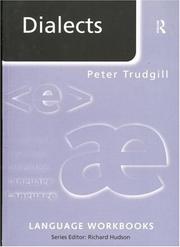
ISBN: 0415090385 9780415090384 Year: 1994 Publisher: London Routledge
Abstract | Keywords | Export | Availability | Bookmark
 Loading...
Loading...Choose an application
- Reference Manager
- EndNote
- RefWorks (Direct export to RefWorks)
Didactics of English --- Dialectology --- English language --- Dialects --- Dialects. --- 802.0-087 --- -English language --- -Germanic languages --- Engels: dialecten --- -Dialects --- -Engels: dialecten --- 802.0-087 Engels: dialecten --- -802.0-087 Engels: dialecten --- Germanic languages --- English language - Dialects - Great Britain. --- English language - Dialects.
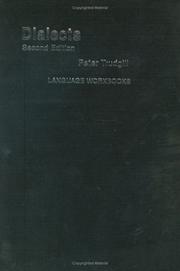
ISBN: 0415342635 0415342627 9780415342629 9780415342636 Year: 2004 Publisher: London Routledge
Abstract | Keywords | Export | Availability | Bookmark
 Loading...
Loading...Choose an application
- Reference Manager
- EndNote
- RefWorks (Direct export to RefWorks)
Routledge Language Workbooks provide absolute beginners with practical introductions to core areas of language study. Books in the series provide comprehensive coverage of the area as well as a basis for further investigation. Each Language Workbook guides the reader through the subject using 'hands-on' language analysis, equipping them with the basic analytical skills needed to handle a wide range of data. Written in a clear and simple style, with all technical concepts fully explained, Language Workbooks can be used for independent study or as part of a taught class. This second edition of Dialects: *has been revised throughout *introduces the many dialects of English spoken in the United Kingdom *reveals the key issues that dialectology engages with *uses both the international phonetic alphabet and simple representations of sounds to explain pronunciations *involves readers in collecting data *contains numerous illustrative maps *is written in a lively and engaging style, with information on 'posh and less posh' dialects and spotting your dialect area.
Engeland --- 802.0-087 --- English language --- -English language --- -Germanic languages --- Engels: dialecten --- Dialects --- -Dialects --- -Engels: dialecten --- 802.0-087 Engels: dialecten --- Engeland. --- -802.0-087 Engels: dialecten --- Germanic languages --- Dialects.

ISBN: 0582021944 9780582021945 Year: 1991 Publisher: London Longman
Abstract | Keywords | Export | Availability | Bookmark
 Loading...
Loading...Choose an application
- Reference Manager
- EndNote
- RefWorks (Direct export to RefWorks)
802.0-087 --- English language --- -English language --- -Germanic languages --- 802.0-087 Engels: dialecten --- Engels: dialecten --- Dialects --- Variation --- -802.0-087 Engels: dialecten --- #KVHA:Dialectologie; Engels --- #KVHA:Grammatica; Engels --- -Engels: dialecten --- Grammar --- Dialectology --- Dialects. --- Variation. --- Anglais (Langue) --- Dialectes --- Grammaire --- Germanic languages --- English language - Dialects. --- English language - Variation.
Book
Year: 1983 Publisher: Stockholm Almqvist & Wiksell
Abstract | Keywords | Export | Availability | Bookmark
 Loading...
Loading...Choose an application
- Reference Manager
- EndNote
- RefWorks (Direct export to RefWorks)
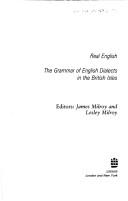
ISBN: 0582081769 0582081777 Year: 1993 Publisher: London Longman
Abstract | Keywords | Export | Availability | Bookmark
 Loading...
Loading...Choose an application
- Reference Manager
- EndNote
- RefWorks (Direct export to RefWorks)
English language --- Grammar --- Great Britain --- Popular culture --- Anglais (Langue) --- Culture populaire --- Dialects --- Dialectes --- Grammaire --- 802.0-087 --- -Popular culture --- Germanic languages --- Engels: dialecten --- -Grammar --- Grammar. --- 802.0-087 Engels: dialecten --- Dialectologie --- Grammatica --- Engelse taalkunde --- Groot-Brittannië --- Dialectology --- Dialects&delete& --- Languages.
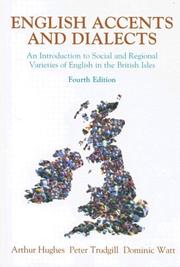
ISBN: 0340887184 9780340887189 Year: 2005 Publisher: London Hodder Arnold
Abstract | Keywords | Export | Availability | Bookmark
 Loading...
Loading...Choose an application
- Reference Manager
- EndNote
- RefWorks (Direct export to RefWorks)
English language --- Anglais (Langue) --- Dialects --- Social aspects --- Variation --- Dialectes --- Aspect social --- Accents and accentuation. --- 802.0-087 --- Engels: dialecten --- 802.0-087 Engels: dialecten --- English language - Great Britain - Accents and accentuation. --- English language - Dialects - Great Britain. --- Acqui 2006
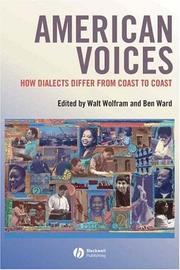
ISBN: 1405121092 9781405121095 1405121084 9781405121088 Year: 2007 Publisher: Malden, Mass. Blackwell
Abstract | Keywords | Export | Availability | Bookmark
 Loading...
Loading...Choose an application
- Reference Manager
- EndNote
- RefWorks (Direct export to RefWorks)
802.0 <73> --- 802.0-087 --- #KVHA:American Studies --- #KVHA:Amerikaanse dialecten --- 802.0-087 Engels: dialecten --- Engels: dialecten --- 802.0 <73> Amerikaans --- Amerikaans --- English language --- Dialect literature, American --- Germanic languages --- Dialects --- Variation --- Dialectology --- North America
Multi
ISBN: 9781107003453 1107003458 9780511763380 9781107515772 9781139776288 1139776282 1139782312 9781139782319 0511763387 9781139779326 113977932X 1283746301 9781283746304 1139888153 1139793691 1139783335 1139777807 1107515777 Year: 2012 Publisher: Cambridge Cambridge University Press
Abstract | Keywords | Export | Availability | Bookmark
 Loading...
Loading...Choose an application
- Reference Manager
- EndNote
- RefWorks (Direct export to RefWorks)
"Variation within the English language is a vast research area, of which dialectology, the study of geographic variation, is a significant part. This book explores grammatical differences between British English dialects, drawing on authentic speech data collected in over thirty counties. In doing so it presents a new approach known as 'corpus-based dialectometry', which focuses on the joint quantitative measurement of dozens of grammatical features to gauge regional differences. These features include, for example, multiple negation (e.g. don't you make no damn mistake), non-standard verbals (e.g. so I says, What have you to do?), or non-standard weak past tense and past participle forms (e.g. they knowed all about these things). Utilizing state-of-the-art dialectometrical analysis and visualization techniques, the book is original both in terms of its fundamental research question ('What are the large-scale patterns of grammatical variability in British English dialects?') as well as in terms of its methodology"--
802.0-5 --- 802.0-087 --- 802.0-5 Engels: grammatica --- Engels: grammatica --- 802.0-087 Engels: dialecten --- Engels: dialecten --- English language --- Dialects --- Grammaticalization --- Syntax --- Variation --- Great Britain --- Languages. --- Grammar --- Dialectology --- Grammaticalization. --- Syntax. --- Arts and Humanities --- Language & Linguistics --- Germanic languages
Book
ISBN: 9780521884976 0521884977 9780511576539 9781107407695 9780511517938 0511517939 9780511515460 0511515464 0511576536 1107200431 9786612103889 0511514395 0511516746 1107407699 9781107200432 6612103884 9780511514395 9780511516740 9781282103887 1282103881 9780511517440 0511517440 Year: 2009 Publisher: Cambridge Cambridge university press
Abstract | Keywords | Export | Availability | Bookmark
 Loading...
Loading...Choose an application
- Reference Manager
- EndNote
- RefWorks (Direct export to RefWorks)
Where do dialects differ from Standard English, and why are they so remarkably resilient? This study argues that commonly used verbs that deviate from Standard English for the most part have a long pedigree. Analysing the language use of over 120 dialect speakers, Lieselotte Anderwald demonstrates that not only are speakers justified historically in using these verbs, systematically these non-standard forms actually make more sense. By constituting a simpler system, they are generally more economical than their Standard English counterparts. Drawing on data collected from the Freiburg English Dialect Corpus (FRED), this innovative and engaging study will be of great interest to students and researchers of English language and linguistics, morphology and syntax.
Dialectology --- Grammar --- English language --- 802.0-087 --- 802.0-55 --- 802.0-55 Engels: morfologie --- Engels: morfologie --- 802.0-087 Engels: dialecten --- Engels: dialecten --- Dialects --- Verb --- Conjugation --- Periphrastic verbs --- Verb phrase --- Verb. --- Arts and Humanities --- Language & Linguistics --- Germanic languages
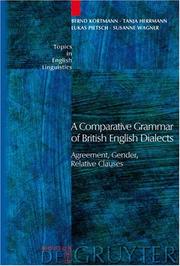
ISBN: 128339653X 9786613396532 3110197510 3110182998 9783110197518 9783110182996 Year: 2005 Volume: 50.1 Publisher: Berlin Mouton de Gruyter
Abstract | Keywords | Export | Availability | Bookmark
 Loading...
Loading...Choose an application
- Reference Manager
- EndNote
- RefWorks (Direct export to RefWorks)
This volume offers qualitative as well as corpus-based quantitative studies on three domains of grammatical variation in the British Isles. All studies draw heavily on the Freiburg English Dialect Corpus (FRED), a computerized corpus for predominantly British English dialects comprising some 2.5 million words. Besides an account of FRED and the advantages which a functional-typological framework offers for the study of dialect grammar, the volume includes the following three substantial studies. Tanja Herrmann's study is the first systematic cross-regional study of relativization strategies for Scotland, Northern Ireland, and four major dialect areas in England. In her research design Hermann has included a number of issues crucial in typological research on relative clauses, above all the Noun Phrase Accessibility Hierarchy. Lukas Pietsch investigates the so-called Northern Subject Rule, a special agreement phenomenon known from Northern England, Scotland and Northern Ireland. His study is primarily based on the Northern Ireland Transcribed Corpus of Speech, but also on the FRED and SED data (Survey of English Dialects) for the North of England. Susanne Wagner is concerned with the phenomenon of pronominal gender, focussing especially on the typologically rather unique semantic gender system in the dialects of Southwest England. This volume will be of interest to dialectologists, sociolinguists, typologists, historical linguists, grammarians, and anyone interested in the structure of spontaneous spoken English.
English language --- Agreement. --- Dialects --- Gender. --- Relative clauses. --- Grammar. --- Great Britain --- Languages. --- Grammar --- Dialectology --- 802.0-087 --- 802.0-56 --- 802.0-56 Engels: syntaxis; semantiek --- Engels: syntaxis; semantiek --- 802.0-087 Engels: dialecten --- Engels: dialecten --- Concord --- Germanic languages --- Agreement --- Gender --- Relative clauses --- Clauses --- Case --- Number --- Person --- Syntax --- Languages --- Dialectology. --- English/ language. --- grammar.
| Listing 1 - 10 of 20 | << page >> |
Sort by
|

 Search
Search Feedback
Feedback About UniCat
About UniCat  Help
Help News
News